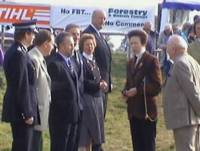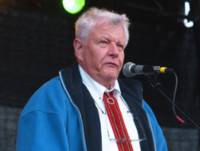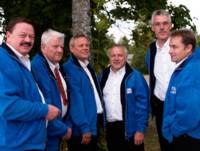ialc
History
When in 1970, the countries of Hungary and Yugoslavia decided to organise a championship, they probably have not guessed what this action will trigger.
What probably could be regarded merely as a regional competition in those days, has become a world championship, with competition scored both in the disciplines and in individual ranking.
The founders of this competition probably had following objectives in mind:
- transboundary, nations binding event in a sporting spirit.
- exchange of information especially in the areas of occupational safety and technology.
- care of comradeship between the participants and nations.
- to facilitate the exchange of experience and information on the development of new
machinery and equipment across the state boundaries.
The founders also created a flag that follows us even today, with the names of all organising countries immortalized on it.
Unfortunately, nobody had the time and effort to put the development of the association on paper. So today it is still quite difficult to collect concrete data and detailed information. Regardless of that, this event was organised for almost 30 times so far.
A high point was surely the moment, and we rejoiced us especially, as Princess Anne opened the World Cup in Scotland.
The list of all organising Nations with the year of the championship can be found here.
List of organising countries
In the beginning, the championship was organised every year, later, probably for cost reasons it has continued as a biannually event.
During this long period, from 1970 to present, the regulations were adapted and improved. Essentially, the changes were necessary for the following reasons:
- The ever-improving and increasingly sophisticated technology made it harder to classify the differences. The rankings lists on these webpages show clearly that many participants often achieved the same number of points. For example, during 1974 competition in Norway, in combined cut event, five participants held the first place with the same number of points. The maximum number of points of 660 in felling has also been repeatedly cracked. So it was necessary to measure in more accurate smaller units, which always asked for the development of more accurate measurement instruments and eventually has led to changes to the regulations.
- The regulatory framework must also take into account the new requirements from the provisions of the occupational safety in different countries. A not simple, but meaningful task.
- The ever-advancing knowledge in the work technology and the development of more efficient new machinery and equipment had to be taken into account.
- I tried to create medals over all championships ever conducted. Please refer to the relevant documents in the art world records on this site
These rankings show who achieved what position on the championships. Dr. János Gólya has provided me with many data available.Thank you for the documents. Unfortunately, these lists are not complete and I would like to take this opportunity to call on all who are in a position to close the existing gaps to report it to the ialc.
Previously, the representatives of the team looked for a country that was willing to take the next occasion to organise the championship. On that occasion, the addresses and other information were given to the new organising country. The organising country then made the necessary changes to the rules more or less independently, based on experience or the national regulations concerning occupational safety. The organising country then re-published, printed the new guidelines, and sent it to the nations.
It is interesting to note the detail that earlier organising nations paid the pocket money to the teams in the national currency of the host country. This was probably, and importantly, because necessary foreign currency was often not available in the participating countries. It was at the championship in Switzerland for the last time that each team received 1500 francs of pocket money. How times changed!
In the national team of Norway respectively also a boy was offered the chance to participate in the World Championships. Dr. Silvius Wodarz led ioc still in the category U 24 and in England is already a junior per nation could participate in the championship.
Later, the ioc (International Organizing Committee) was established. This internationally assembled committee of 5 people supervised the eventnow, but without taking big part in the organisation. Sometimes, the other advisers, mostly former presidents of OC or experienced competitors from other countries attended meetings of the ioc. The new organising country would become a member of ioc and had also chaired it, and oldest organising country representative would resign the position.
This organisation functioned quite properly over many years. The organising country had however, fairly large expenses. I think it was because of the following tasks:
- development and modification of the regulation, including printing and mailing it to the nations.
- collection and dissemination of information and addresses.
- organisation of referee service and training of referees.
- development and provision of an appropriate evaluation program.
- to customize and develop appropriate tools and measuring instruments.
- organisation of all necessary financial resources.
- providing the necessary infrastructure, food and lodging for the participating countries, etc., etc.
Not least because of the high costs caused by all these tasks, and because of poor use of existing synergies, some thoughts appeared that the whole thing could be cheaper, more efficient and better organised.
Under the direction of our Honorary Chairman Silvius Wodarz the Frankfurt circle was founded and it has set goals to establish the ialc and so to offer assistance to the organising country. Above all, it was to better use the synergies from past championships and to avoid situations where organising country had to start from scratch again.
The sponsors were also found soon, to support the project financially and with advice. The ialc sponsoring pool has a great credit for making this a World Federation at all.
But other members of the Frankfurt circleas well, today on the Board of ialc, could be credited for big unpaid work in the development of the young association.
At this point I would like sincerely thank to all who engaged themselves in establishment of ialc.
The association, initially looked upon with great scepticism, was finally founded and presented at the World Championships in Turin and the old ioc was dissolved.
The PPP shown then is still valid and had to be only slightly adjusted. It should noted, however, that a World Cup costs a lot of money and the financing of such event in the course of financing models is not taken into account. The PPP here is limited to the internal affairs of the association.
Financing Model ialc
Problems of the IOC
Present
Since its establishment, the ialc supervises and monitors the World Championships. In contrast to the previous ioc, the ialc has taken over following tasks and can thus help the organising country:
- It makes changes to the rules at the request of Nations , and makes them available to organising country. It translates the rules in one of the host country understandable language and translates the rules in as many languages possible.
- It leads the negotiations between the sponsoring pool and the host country and makes guaranteed contributions from sponsoring pool available to the organising country.
- It monitors the statutes of the association, and changes them at the request of nations.
- It organises and develops appropriate measuring devices and instruments for determining the results and delivers it to the organising country. Nations can also purchase measuring devices through the ialc at the cost price.
- It assists in training of the referees and is responsible for a correct evaluation of the performance of the participants. It also makes available to the ialc nations the methodological and educational aids necessary for a good training of the referees.
- It makes available to the organising country the appropriate evaluation program and the protocols for the recording of the event results.
- It informs the nations and the sponsoring pool about championship and the association's activities.
- It designs and maintains the website of the Association.
- It tries to make the competition attractive to the viewers, to design and develop new disciplines, including the necessary regulations and evaluations.
- It is also assisting nations in the organisation of their national championships.
- It maintains a technical Commission, which provides the organising country all necessary assistance to control and set up event fields before the championships.
- As a supreme body, it organizes and leads the jury, makes the final decisions on appeals relating to measurements or assessments.
- It is committed to find a new host country every 2 years.
- It organizes and conducts meetings by members etc.
Even from this certainly not complete list of activities of the association can be seen that synergies from past championships are used and made available to the organising country. This allows for many costs to be saved.
In the short time since the founding, the association has done a great job, and this was recognized by the member countries today and made a good reputation. It is to hope that the association will continue to work and satisfy the wishes of all members.
Future
It is not easy to say in advance how the Association and the LOGGING WORLD CHAMPIONSHIPS will develop in the future. The mechanisation in forestry is clearly moving towards full mechanisation of the work with the suitable work procedures. The trees are cut more and more with harvesters and the manual felling is used less and less, mostly on such terrains where large machines cannot be used. The training of forestry staff goes also in this direction, there will be fewer all-rounders, but more trained specialists, who could operate eventually these machines.
Even the financing of such major events always cost more money, and it is not easy to provide the necessary resources.
The effort will be put to make the disciplines and, above all, the evaluation criteria comparable so that measurable world records can be identified. It will be the task of the association, to track such achieved results as world records and to harmonise it with the national and international championships.
We hope that the association will timely recognise the signs of the times and correct the disciplines accordingly.
Basel, in May 2007
President of ialc - Max Fischer




